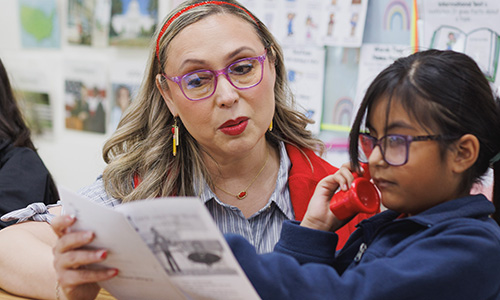
In the realm of instructional coaching, trust is the linchpin that holds together the transformative journey a coach and teacher go on together. While having a bowl of chocolates at your desk to share with the teachers you work with may be charming (and certainly has its place), the essence of building trust has to go far beyond mere gestures.
Building trust—real trust—in an instructional coaching relationship requires embodying qualities that resonate deeply with teachers so that you can create a foundation of partnership, reliability, consistency, and confidentiality. These are the true “chocolates” that invite teachers into a space of growth and learning. As our Lindsay Deacon and Angela Scotto Harkness say in their book, The EduCoach Survival Guide, “without trust, there could be no coaching.”
Equally vital are the intangible elements that serve as a metaphorical bowl, cradling and supporting your trust-building endeavor. Warmth, character, and stewardship provide the vessel in which these essential qualities are held, nurturing a climate of trust that fosters genuine collaboration and development.
Let’s look at all of those elements—partnership, reliability, consistency, confidentiality, warmth, character, and stewardship—as you consider your role as an instructional coach.
Partnership: Co-creating the journey
It is important that coaches and teachers approach their interactions as partnerships, not hierarchical relationships.
Involving the teachers you work with in decision-making, seeking their input, and valuing their expertise during joint planning sessions taps into a teacher’s agency and helps them begin to trust you: their coach.
Partnerships also encourage active participation from teachers. As Lindsay and Angela explain, “If coaches don’t really get to know the teachers in their school and learn what’s important to them, the impact of coaching will be less effective.” The more often coaches can tailor their approach to meet each teacher’s unique needs, preferences, and goals, the more impactful the relationship will be. Showing that you understand and care about a teacher’s circumstances demonstrates compassion and improves the partnership.
Reliability: A pillar of dependability
In strong partnerships, both members are responsible for reliability. Without reliability, it’s difficult to build trust, in any kind of relationship. If a car is unreliable, for example, it still runs, but perhaps not always when it’s needed most. The owner might find other methods of transportation when they absolutely must be somewhere at a certain time—methods that might be costly, inefficient, or exhausting. Similarly, teachers will look elsewhere for advice or support if their coach does not remain committed to the coaching relationship. While these other places might serve a teacher’s short-term goals by providing quick solutions, long-term change to their teaching practice is less likely to occur.
Coaching is most impactful when teachers and coaches work together throughout a coaching cycle. This cycle begins with coaches and teachers setting expectations for themselves and for the relationship. Establishing clear guidelines for what the coaching sessions will look like, where they’ll take place, and what the responsibilities of each person will be needs to occur within the first few sessions. Then, both parties need to stick to their guidelines if they want to build reliability.
Teachers want to know that the time spent in instructional coaching sessions will be valuable and won’t add to their already lengthy to-do list.
The use of protocols and checklists for meetings helps ensure teachers and coaches come to meetings prepared and ready to focus on the day’s tasks. When teachers can predict what coaching sessions will look and feel like, they know they can rely on the sessions to be productive and useful. Teachers want to know that the time spent in instructional coaching sessions will be valuable and won’t add to their already lengthy to-do list.
Consistency: The backbone of trust
Many of the behaviors that demonstrate reliability lead to consistency. Coaches and teachers must intentionally practice reliability for consistency to occur.
Choosing to use the same meeting protocols and sticking to the agenda during coaching sessions removes confusion and inefficiency. When coaches provide resources, feedback, and further assistance, and when they then follow through in the agreed-upon timeframe repeatedly, they demonstrate their commitment to the shared goal of the coaching relationship. The consistency of engaging in coaching sessions week after week, without interruptions or cancellations, shows that both coach and teacher have prioritized coaching and the benefits it provides for teachers and their students.
Confidentiality: Building safe spaces
Perhaps the greatest quality of a successful coaching relationship is confidentiality. Teachers who enter a coaching agreement must be able to share their struggles as well as their successes. (To learn from your mistakes, you must be able to admit those mistakes in the first place, right?) It’s difficult for teachers to express disappointment or frustration in their teaching practice if they’re worried the information might be shared with the administration or other teachers in the building.
Instructional coaches can communicate their dedication to confidentiality by providing a safe space for coaching sessions. This might mean holding meetings in private spaces within the building, playing background music or white noise to account for thin walls, or using a “do not disturb” sign to let others know a coaching session is taking place.
As an instructional coach, you can also let the teachers you work with know that all coaching conversations will remain private and that it is up to the teacher if they want to share the successes (or struggles) of both their teaching practice and the coaching cycle with others. The coaching relationship is similar to that of doctors and their patients, or attorneys and their clients: confidentiality must always be at the forefront.
Warmth, character, and stewardship: The crucible of trust
While partnership, reliability, consistency, and confidentiality serve as the inviting “chocolates” of instructional coaching, it is your warmth, character, and stewardship that hold it all together. “Right now, teachers need people who care about them more than ever,” Lindsay and Angela explain in their book.
Instructional coaches with warmth create a welcoming environment where teachers feel valued and respected. A coach’s character speaks to the integrity and authenticity that underpins every interaction they have with others. Stewardship embodies your dedication to a teacher’s success and acts as a guiding force throughout your journey.
Chocolate is just the start
Beyond the allure of a bowl of chocolates lies the true heart of instructional coaching: the art of building trust. Through the consistent application of partnership, reliability, consistency, confidentiality, warmth, character, and stewardship, you can pave the way for transformative growth in the teachers you work with. It’s in these intentional actions and genuine connections that trust takes root, creating a fertile ground for teachers to flourish in their professional endeavors.
Instructional coaches can—and should—commit to going beyond the surface, cultivating trust that stands the test of time.
To learn more about instructional coaching, check out Lindsay and Angela’s Educoach Survival Guide and instructional coaching services available through NWEA.



